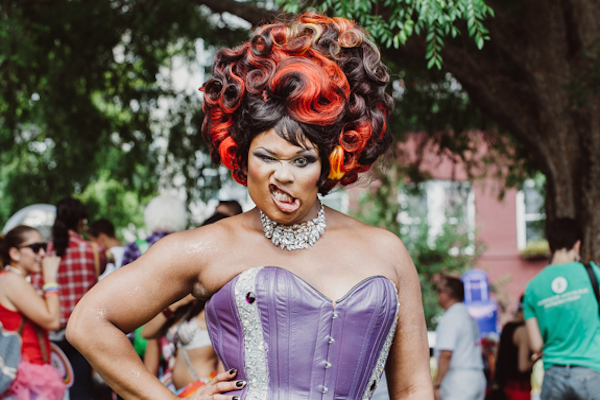


Nicole Santamaria and Cori Alonso-Yoder speaking at the 2015 Atlantic LGBT Summit (Photo: The Atlantic/Kristoffer Tripplaar)
There have been a lot of recent discussions about the treatment of LGBTQI persons in countries like Syria and Russia. However, the challenges and violence facing our community in our own backyard have been continuously overlooked on the main stage.
We spoke with Nicole Santamaria, an intersex transsexual woman currently in the midst of her asylum process, and her attorney, Cori Alonso-Yoder of Whitman-Walker Health, to better understand the obstacles our community is facing on their path to safety.
Currently, Santamaria’s home country of El Salvador has zero protections for its LGBTQI population. There are no legal protections from discrimination or hate crimes, as seen during last year’s Pride event when Aldo Alexander Peña was nearly beaten to death by police. The mixture of a post-war economy plus machista and gang cultures has made both women and the queer community particular targets.
“The situation for LGBTQI communities in countries like Guatemala, El Salvador and Honduras are really, really bad,” explains Santamaria, “I was telling Cori that a bookkeeper from my Colectivo was murdered this year on May 31, but there is no kind of willing from the police and there is no kind of willing from the government to solve these cases.”
Not only are cases going unsolved; the police have been direct perpetrators of the violence. “When I was working as an activist in El Salvador, I made many complaints against the police because they were the ones that were prosecuting the lesbian and transgender women. And they are putting them in jail and they are raping them in jail,” says Santamaria. She also states that when crimes are reported, the police are leaking their personal information, like addresses and phone numbers, directly to the gangs, which target them again.
In El Salvador, Santamaria was the Secretary of Asociación Colectivo Alejandría, an advocacy group for transgender and intersex people. She was also a member of the Salvadoran Network of Defenders of Women’s Human Rights.
She escaped to the United States after she was attacked and left for dead on April 1, 2015. Her circumstances allowed her to relocate immediately to the United States but others have not been so lucky. Santamaria was both aware of the legal system and already had a visa from previously speaking on LGBTQI panels in the United States.
“I consider myself blessed and lucky that I have the opportunity to speak the language and be an activist and know my rights. Because what happens to the other people who come through the border? They don’t have the visa and they don’t speak the language and they don’t know anything about activism,” explains Santamaria.
“There are a couple of issues that come into play,” states Alonso-Yoder, expanding on the issue. “Many people have been exposed to violence when they come to the U.S. so they are not necessarily in a mindset where they are comfortable identifying themselves within that community. The trauma also has a big effect on people’s ability to state why they were targeted or mistreated. Just general lack of knowledge of how important stating some of those claims may be can also affect people’s willingness to say it.”
Not only do most LGBTQI people have a hard time defining themselves as such, many have no idea that they are a protected social group under refugee status and thus legally eligible for help if they frame their case as such.
“The others are ones that people are more familiar with: religion, political opinion, race, nationality, that sort of thing. However, ‘particular social group’ is one of the most uncharted – but at the same time most litigated- definitions under the refugee law. So for a lot of people that are coming, in particular the people who are intercepted at the border who have not yet had the opportunity to frame their claim with the attorney who is aware of the legal definition, they are unaware they have to express their fear in a way that falls within a legal standard.”
Instead of developing their cases with knowledgeable attorneys that they are comfortable disclosing to, most asylum-seekers are deported before they even get the chance to be heard.
Even once an applicant has properly applied, there are still obstacles within the system to overcome. Applications that used to take three to four months to process are now taking two to three years due to a backlog.
“It’s important for people to understand that the asylum process that we’re dealing with right now is a system that is under incredible stress and as a result is not fully realizing its mandate toward people in fear and people seeking protection in the states,” says Alonso-Yoder.
Even with all of the setbacks, there is still hope for those in need. Santamaria is working tirelessly with organizations in the United States and back in El Salvador to help those in danger understand their rights and acquire proper legal assistance.
Another measure that Alonso Yoder discusses is Temporary Protective Status for members of our community. Currently people awaiting asylum face challenges with health care, the ability to work, and being joined by family members.
“[The Temporary Protective Status] does not require an individual asylum hearing. Basically, if you can show that you are from a certain country and you have been in the United States since a certain date, then you are eligible to remain here on temporary basis while your country is undergoing a crisis,” explains Alonso-Yoder.
The United States has experienced three waves of migration from El Salvador since their civil war in the 1980s and this is the only wave in which Temporary Protective Status is not being issued. This need has become even more immediate since the recent announcement of possible deportation raids across the United States.
“Deportation is sending them to death, directly,” says Santamaria. Alonso-Yoder adds that 83 deaths have been directly linked to deportation in the last two years. She believes the United States has a particular responsibility to this issue and to members of these communities.
“Particularly in Central America, where much of the violence has been influenced by factors within the United States, and the immigration and deportation of criminals to those areas, I think have a unique responsibility, not only as the United States, a standard-bearer for human rights and providing safety and protection to refugees, but also just reaping what we’ve sown as far as why some of this violence exists in Central America.”
For legal services and more information about legal services or your rights, please visit the links below:
https://www.whitman-walker.org/legal/legal-services/
https://www.aclu.org/know-your-rights/what-do-if-youre-stopped-police-immigration-agents-or-fbi
https://www.aclu.org/know-your-rights/que-debe-hacer-si-la-policia-agentes-de-inmigracion-o-el-fbi-lo-detienen